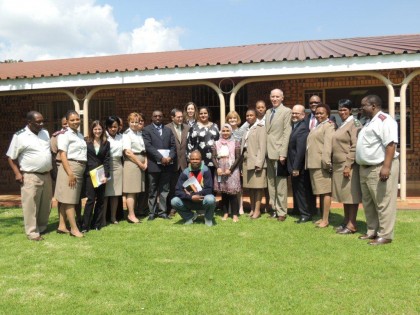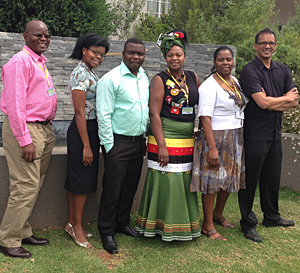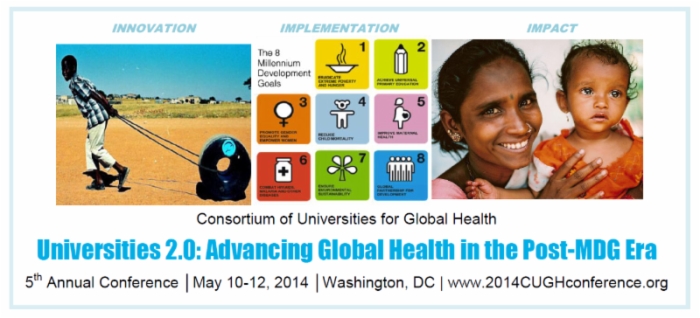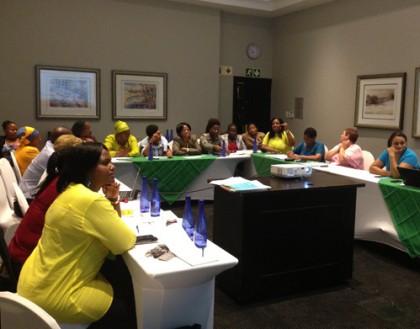Programs in I-TECH South Africa are funded by the United States government, via the U.S. Centers for Disease Control and Prevention’s Global AIDS Program (CDC GAP), South Africa, through the President’s Emergency Plan for AIDS Relief (PEPFAR). I-TECH also partners with the National Department of Health and a variety of local organizations, agencies, and institutions in South Africa.
Category: South Africa
Pamela Kohler

Pamela Kohler, PhD, MPH, BSN, co-directs I-TECH and holds a joint appointment in Child, Family, and Population Health Nursing, and the Department of Global Health. At I-TECH, Dr. Kohler led the Tanzania Intermediate Field Epidemiology Training Program (FETP) and currently leads the evaluation and continuous quality improvement activities of the Afya Hatua Project under Tanzania Health Promotion Support. She has led multiple evaluations of programs and policies throughout Eastern and Southern Africa, including HIV differentiated care, cervical cancer screening and treatment, and cryptococcol meningitis services.
Dr. Kohler’s research involves development and testing of health services interventions to improve engagement in HIV care. She led two trials using standardized patient actors to destigmatize HIV prevention and treatment services for adolescents in Kenya and currently leads a stepped care intervention, assigning intensity of services to those with highest need, in Western Kenya. Dr. Kohler completed her nursing training at Johns Hopkins University, and worked clinically in HIV care and Emergency Departments. She holds a PhD in Nursing and an MPH in Health Services from the University of Washington.
Publications
McConnico C, Jed SL, Marumo E, Mazibuko S, Mema GM, DeKadt J, Holmes K, Kohler PK. Systems Mapping of Sexually Transmitted Infection Services at Three Clinical Sentinel Surveillance Sites in South Africa: Opportunities for Integrated Care. J Assoc Nurses AIDS Care. 2017 Jan-Feb. pii: S1055-3290(16)30121-2. doi: 10.1016/j.jana.2016.09.004.
Kohler PK, Marumo E, Jed SL, Mema G, Galagan S, Tapia K, Pillay E, DeKadt J, Naidoo E, Dombrowski JC, Holmes KK. A national evaluation using standardised patient actors to assess STI services in public sector clinical sentinel surveillance facilities in South Africa. Sex Transm Infect. 2017 Jan 27. pii: sextrans-2016-052930. doi: 10.1136/sextrans-2016-052930.
Kohler PK, Tippett Barr BA, Kangʼombe A, Hofstee C, Kilembe F, Galagan S, Chilongozi D, Namate D, Machaya M, Kabwere K, Mwale M, Msunguma W, Reed J, Chimbwandira F. Safety, Feasibility, and Acceptability of the PrePex Device for Adult Male Circumcision in Malawi. J Acquir Immune Defic Syndr. 2016 Jun 1;72 Suppl 1:S49-55. doi: 10.1097/QAI.0000000000000774.
Kohler PK, Namate D, Barnhart S, Chimbwandira F, Tippet-Barr BA, Perdue T, Chilongozi DA, Tenthani L, Phiri O, Msungama W, Holmes KK, Krieger JN. Classification and rates of adverse events in a Malawi male circumcision program: impact of quality improvement training. BMC Health Serv Res. 2016 Feb 17;16(1):61. doi: 10.1186/s12913-016-1305-x.
Program Highlights
Strengthening the Community Healthcare Worker (CHW) Program in South Africa
I-TECH has supported the South African Government’s National Department of Health (NDoH) to strengthen its community health workers (CHWs) program so that it promotes linkage, adherence, and retention in HIV care and treatment. The program also aimed to improve HIV care and treatment, and patient outcomes by addressing knowledge and skills gaps that result in low performance related to HIV Care and Treatment indicators.
I-TECH collaborated with the NDoH, district support partners (DSPs), and educational institutions to implement a CHW skills development program to train over 22, 000 CHWs, making strides toward achieving the UNAIDS targets.
Health Information Systems in South Africa
I-TECH in South Africa has helped strengthen in-service learning platforms for the training and professional development of health care workers, including SkillSMART and the Knowledge Hub.
Continue reading “Health Information Systems in South Africa”
Strengthening Regional Training Centres in South Africa
I-TECH supported Regional Training Centers (RTCs) across provinces in South Africa to increase their capacity to coordinate in-service trainings, with an emphasis on reaching the 90-90-90 targets. I-TECH strengthened the capacity of RTC management to coordinate, consolidate, implement and evaluate training activities and supported the rollout of national priority programs such as adult primary care; training initiatives to enable nurses to deliver tests and offer services, and develop the capacity of RTCs to promote alternative service delivery models, particularly adherence clubs. Additionally, I-TECH supported the National Department of Health (NDoH) through the RTCs to roll out a national recruitment and retention strategy and in-service learning strategy, to ensure appropriate human resources for health within public health service. I-TECH also provided continuous technical support for the development of a distance learning program and supported the recruitment and placement of technical personnel at NDoH to support RTCs and offer logistical support for quarterly training review stakeholders meetings.
Key Populations Sensitization Training for Health Care Workers in South Africa
I-TECH South Africa supported the development, implementation, and evaluation of a comprehensive sensitization and capacity development pilot intervention with the following objective: sensitize clinical and non-clinical staff at the primary care and community levels on issues related to stigma and discrimination as they relate to five key populations (men who have sex with men, people in prisons and other closed settings, sex workers, people who inject drugs, and transgender people).
I-TECH Presents at CUGH 2014
I-TECH staff will head to Washington, D.C., this week to the Fifth Annual Consortium of Universities for Global Health (CUGH) Conference, which will take place at the Washington Hilton from May 10-12. More than 1,300 participants from 50 countries are expected to attend the conference, co-hosted by the George Washington University and Stanford University.
This year’s theme is “Universities 2.0: Advancing Global Health in the Post-MDG Era,” and I-TECH teams will present on forward-looking topics ranging from the implementation of electronic medical records to partnership with the U.S. President’s Emergency Plan for AIDS Relief (PEPFAR).
Confirmed speakers include President of the World Bank Jim Kim; former Head of UNAIDS and current Director of the London School of Hygiene and Tropical Medicine Peter Piot; and Head of the Earth Institute at Columbia University Jeff Sachs. Dr. King Holmes, I-TECH Principal Investigator and 2013 Gairdner Global Health Awardee, will also speak at CUGH’s Gairdner Lecture on May 12.
For those planning to attend the conference, don’t forget to check out the University of Washington Department of Global Health table — and to stop by the I-TECH presentations, listed below.
Kenya
- Electronic Medical Record (EMR) Implementation at Scale in the Public Health Sector: Lessons Learned in Kenya
Haiti
- Using an electronic medical record system to identify factors associated with attrition from the HIV antiretroviral therapy program at two hospitals in Haiti
- Before and After the Earthquake: A Case Study of Attrition from the HIV Antiretroviral Therapy Program in Haiti
South Africa
- Successes and challenges in liaising with PEPFAR partners and stakeholders in the TB/HIV Management Program
- Evaluation of a comprehensive HIV prevention program in North West Province, South Africa: results from the pilot
- Integrating research into program design: Conducting a situational analysis to inform comprehensive HIV prevention and care in North West Province, South Africa
- Mystery patients: Training actors to serve as unannounced standardized patients to evaluate training outcomes for sexually transmitted infections in South Africa
Lab Leadership and Management
- Certificate Program in Clinical and Public Health Laboratory Leadership and Management
Contact Anne Fox in Communications to see any of these completed posters.
About CUGH:
Founded by leading North American university global health programs, CUGH aims to:
- Define the field and discipline of global health;
- Standardize required curricula and competencies for global health;
- Define criteria and conditions for student and faculty field placements in host institutions;
- Provide coordination of projects and initiatives among and between resource-rich universities and less-developed nations and their institutions.
CUGH is dedicated to creating balance in resources and in the exchange of students and faculty between institutions in rich and poor countries, recognizing the importance of equal partnership between the academic institutions in developing nations and their resource-rich counterparts in the planning, implementation, management and impact evaluation of joint projects.
The Bill & Melinda Gates Foundation provided the leadership and funding to plan this consortium. The Rockefeller Foundation provided a grant to help develop the organizational structure of CUGH in its first year of existence.
HRSA Delegation Witnesses I-TECH’s Vital Work in South Africa

In late March, I-TECH South Africa hosted a delegation from the U.S. Department of Health and Human Services, Health Resources and Services Administration (HRSA).
Led by Dr. Mary Wakefield, HRSA Administrator, the delegation also included Ambassador Jimmy Kolker, Assistant Secretary for Global Affairs, U.S. Department of Health and Human Services (HHS); Dr. Austin Demby, Director – PEPFAR, Office of Global Affairs, HHS; and Dr. Jose Rafi Morales, Director HRSA/HAB PEPFAR Global HIV/AIDS Program.
The group was accompanied in-country by Steven T. Smith, Health Attaché and HHS Regional Representative for Southern Africa; Dr. Nancy Knight, CDC Country Director; Rehmeth Fakroodeen, CDC HSS lead and HRSA Activity Manager; and the I-TECH Senior Management Team.
The purpose of the visit was to observe the following activities, funded by HRSA through the U.S. President’s Emergency Plan for AIDS Relief (PEPFAR).
Training Correctional Health Workers
With 165,000 inmates incarcerated in 237 correctional facilities, South Africa has the fourth-highest global incarceration rate, and the country’s facilities are operating at 137% of intended capacity.[1]Overcrowding leads to insufficient ventilation and poor physical and mental health, all of which fuel the spread of HIV and tuberculosis (TB). HIV prevalence in these facilities is as high as 34.6%,[2] and the reported TB cure rate is less than 40%, compared to 70% in the general population.[3]
Ensuring adequate skills among health care providers in correctional facilities is essential to fight the spread of HIV and other communicable diseases. During its first visit, to a DCS health facility in Witbank, the HRSA delegation witnessed first-hand I-TECH’s work to conduct a situational analysis and support the training of health care workers on the care and management HIV and AIDS, tuberculosis, and sexually transmitted infections (STIs). This work was conducted in two regions: Limpopo, Mpumalanga, and North West (LMN) and KwaZulu-Natal.
Supporting Continuing Professional Development for Nurses
In 2012, the SANC started the process of developing a Continuing Professional Development (CPD) Program for the 262,000 nurses in South Africa[4]; however, due to funding constraints and lack of capacity, I-TECH South Africa was asked to support them in the program’s development. Through the CPD Program, nursing practitioners will be required to attain a minimum number of CPD points as a prerequisite for annual renewal of their license to practice.
The HRSA delegation met with the Chair of the Board of Directors of SANC and its Registrar, as well as representatives from the National Department of Health and academic institutions. Members of the delegation were briefed on achievements to date, which include technical assistance to establish a CPD technical working group and a draft CPD framework for nurses, a situational analysis of feasibility and acceptability of CPD, and a CPD pilot study outline developed for two provinces.
[1] Institute of Medicine. Key Populations, Key Solutions – A Gap Analysis & Recommendations for Key Populations and HIV in South Africa. Accessed 17 March 2013. http://southafrica.iom.int/publication/key-populations-key-solutions-a-gap-analysis-recommendations-for-key-populations-and-hiv-in-sa/
[2] South African Department of Correctional Services. 2007 Prevalence Survey for HIV.
[3]Verbal communication with South African National Department of Correctional Services on 28 March 2013.
[4] South African Nursing Council Licensure Register.
I-TECH South Africa Hosts I-TECH’s First Training for Standardized Patients
I-TECH South Africa is using Standardized Patients to measure the quality of care for sexually transmitted infections (STIs) for an operations research (OR) study in the Northwest Province. Ten South African actors, five men and five women, will visit 40 clinics before a new STI training program and at two time periods after the training.
I-TECH South Africa Co-Hosts Third National Regional Training Centre Conference
Every biennium, the South African National Department of Health hosts a National Regional Training Center (RTC) Conference that brings together RTC managers, their line management, as well as key policy makers from the National and Provincial Departments of Health.This year I-TECH South Africa was honored to serve as a co-host.
This was the third national conference, and this year the theme was A Decade of Strengthening the Health Care System: Developing Human Resources for Health through the Regional Training Centers.
The popular conference registered 137 delegates out of the expected 120. Public health experts delivered compelling talks, whose topics ranged from leadership and management to innovative ways of delivering training.

I-TECH South Africa presented a talk on The Findings of the Situational Analysis in Nine Regional Training Centres of South Africa, as well as a report on Regional Training Center Models, which was authored by Dr Nathan Linsk, a professor at the Jane Addams College of Social Work at the University of Illinois at Chicago, who drew on his 25 years experience with the US AIDS Education and Training Centers network. Both of these reports contributed significantly to the subsequent three days of discussion about the future of Regional Training Centers in South Africa.
During the conference, delegates were divided into five commission that looked at:
- Future role (Coordination of all in-service training; Institutional Base, Location, Funding model)
- Resources for RTCs (Human, IT, Internet connectivity, Equipment, Infrastructure etc.)
- Training and Education Approach (Mentoring, distance learning and Resource Library)
- Coordination, Accreditation and linkages with academic institutions (levels of accreditation, certification etc.)
- Planning, M & E, Reporting (Training needs analysis, integrated planning, M & E systems)
RTC managers took the worksheets from the 5 Commissions and developed an action plan, which was presented by the National Department of Health in a plenary session. As part of the next steps, I-TECH South Africa and NDOH will write a Conference report that will contain the action plan and a monitoring and evaluation plan as attachments. The NDOH will present the action plan to the National Health Council, made up of the National and Provincial Ministers of Health, for high level decisions and support toward the implementation of the proposed model.

